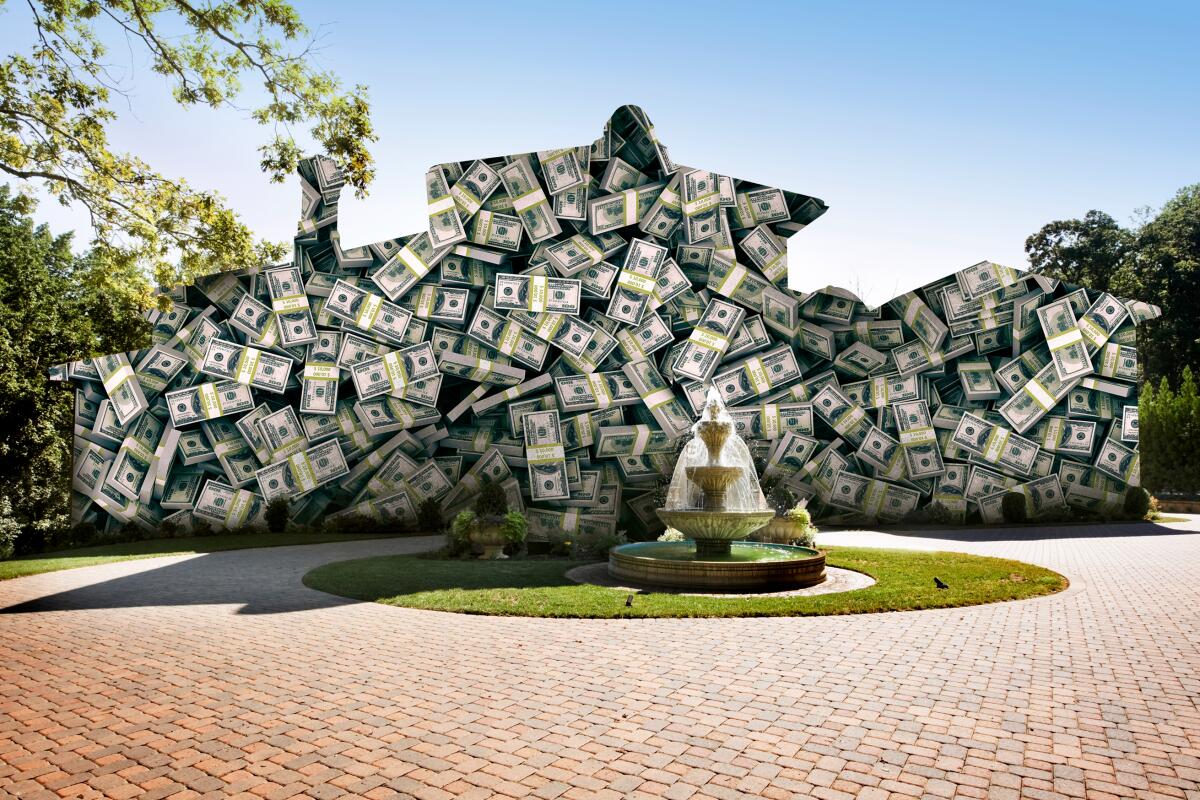The year of the ‘mansion tax’: Hundreds of millions raised, but a chill to L.A.’s luxury market

- Share via
One year ago, Los Angeles’ “mansion tax” took effect. It has either been a godsend or an absolute disaster, depending on who you ask.
The transfer tax, formally known as Measure ULA, levies a 4% charge on all property sales above $5 million and a 5.5% charge on sales above $10 million, with proceeds funding affordable housing and homelessness initiatives.
When L.A. voters approved the measure in November 2022, it quickly became the dominating storyline in L.A. real estate.
Proponents say the tax generates crucial funding to address L.A.’s housing crisis, and they’re right. In its first year, Measure ULA has raised roughly $215 million, according to the L.A. Housing Department.
The L.A. City Council passed a $150-million spending plan for ULA funds in August, and the money has been flowing into six programs: short-term emergency rental assistance, eviction defense, tenant outreach and education, direct cash assistance for low-income seniors and people with disabilities, tenant protections and affordable housing production.
Critics, including many L.A. real estate professionals, claim the tax has hampered the market — not just luxury home sales, but also multifamily developments and commercial properties, since the tax applies to all property sales above $5 million.
They’re also right.
When the tax first took effect on April 1, 2023, it all but froze L.A.’s luxury real estate market, with many sellers pulling their homes off the market at the prospect of paying an extra few hundred thousand in taxes if they sold.
A year later, the market is still just as icy.
The striking slowdown is partly due to chilled buying across Southern California, as soaring interest rates keep many prospective buyers out of the house hunt altogether. But in L.A. — the only city affected by the tax — home sales above $5 million have plummeted at twice the rate of other affluent cities, as buyers opt for homes in neighboring areas that aren’t subject to the tax.
From April 2022 to March 2023, the year before Measure ULA hit, L.A. had 366 single-family home sales of $5 million or more. In the 12 months since, there were just 166 — a drop of roughly 68%.
Luxury sales in nearby cities have slowed, but not nearly at the same rate, according to data from the Multiple Listing Service.
In Beverly Hills, single-family sales dropped 24%.
In Santa Monica, single-family sales dropped 29%.
In Malibu, single-family sales dropped 28%.
“My clients are leaving L.A.,” said Jason Oppenheim, a luxury real estate agent who stars in the real estate reality show “Selling Sunset.” “We can’t keep pushing the wealthy out of our city.”
Oppenheim and his team spent much of the seventh season of the show speaking out against the tax, which they claim pushes prospective buyers out of L.A. and into other affluent areas.
“This tax has not had the effect that was promised, and it’s time for everyone to put aside their egos and realize this was a mistake,” Oppenheim said.
The drop-off comes from a few different factors. Many luxury homeowners moved to sell their properties last spring before the tax took effect, including celebrities such as Mark Wahlberg and Brad Pitt.
Others explored loopholes to avoid paying the tax, such as splitting properties into multiple parts and selling them separately to stay under the $5-million mark.
As a result, Measure ULA hasn’t raised nearly as much as originally projected.
Early proponents of Measure ULA estimated the tax would raise roughly $900 million per year. Last March, a report from the City Administrative Office lowered that number to $672 million.
At $215 million, the total is well short of initial projections, but Greg Good, a senior advisor on policy and external affairs for the L.A. Housing Department, said he expects it to be much higher going forward.
In the first three months of Measure ULA, the tax raised $15 million, only $5 million per month. But from July 2023 to February 2024, the tax raised roughly $200 million, or $25 million per month. Projections for the city’s fiscal year, which starts on July 1 and ends on June 30, would be around $300 million.
“Despite litigation, despite the chilled market, despite the wealth defense industry designed to help the rich protect their money from taxes, that’s $300 million for housing and homelessness initiatives,” Good said.
So far, the city has spent around $28 million in aid to distressed tenants and landlords, $23 million on eviction protection and tenant outreach and $56.8 million on loans to accelerate the development of affordable multifamily housing projects.
“None of that happens without ULA,” Good said.
L.A.’s real estate community has fought the tax tooth-and-nail, campaigning against the measure when it was on the ballot in November 2022 and trying to find ways to overturn it after it was passed.
The latest challenge — a lawsuit claiming the tax was unconstitutional — was shut down in October, when an L.A. County judge dismissed the case, but the plaintiffs are in the process of appealing the decision.
The next hurdle the measure will face comes in November, when Californians will vote on a statewide ballot initiative called the “Taxpayer Protection Act.” If passed, the act would require special taxes to be approved by two-thirds of the vote instead of a simple majority, applying to all measures adopted after Jan. 1, 2022. Since Measure ULA was adopted in 2023 and only received 57% approval, it could require another vote or potentially be repealed.
Gov. Gavin Newsom filed an emergency petition to remove the initiative from the ballot, but the status of the petition is unclear.
“This is a David-vs.-Goliath story. Moneyed interests are trying to stop Angelenos from addressing this existential crisis, but I believe voters will flip the script at the polls and beat it back,” Good said. “We’re going to attack the housing crisis with vigor and zeal for as long as it takes.”
More to Read
Sign up for Essential California
The most important California stories and recommendations in your inbox every morning.
You may occasionally receive promotional content from the Los Angeles Times.










